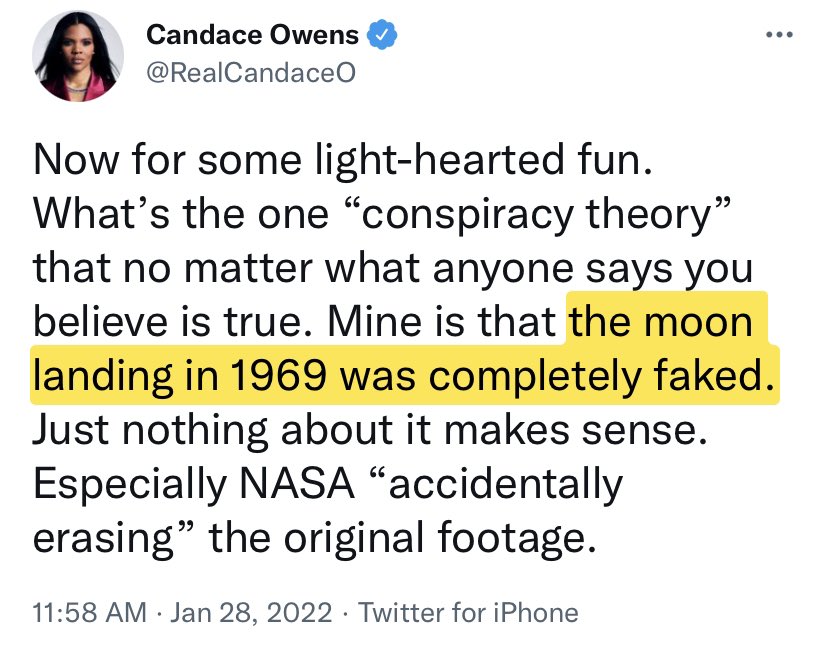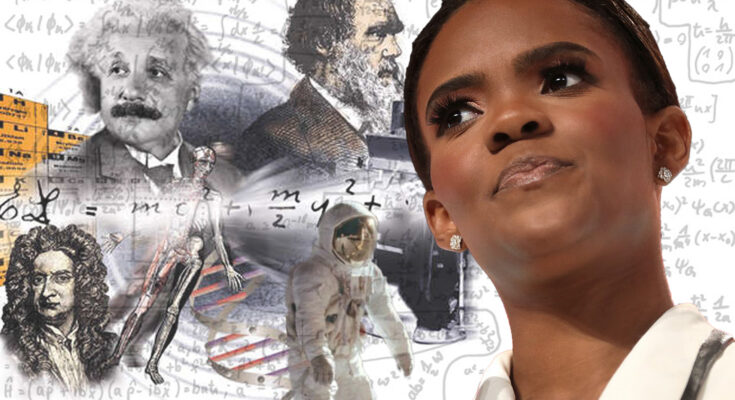This week I watched Right Wing grifter extraordinaire Candace Owens, on the Bill Maher podcast, Club Random.
Of the many breathtakingly stupid statements made during her appearance, the one that most galled me was her confident claim, a mere 7 minutes into the interview, that anthropogenic climate change was a “hoax”.
She went on to loudly boast, “First of all, I know what I’m talking about with climate stuff!” To which Bill Maher pivoted and asked her, “Do you believe that people landed on the moon?” She looked bewildered and accused him of changing the subject. But Maher had a salient point.

He was actually referring to a January 2022 tweet by Owens, where she suggested that the 1969 moon landing was a hoax and that she has never believed — to coin a popular conspiracy phrase– the official narrative.
On the subject of Neil Armstrong landing on the moon, she later tweeted, “I just cannot”.
Maher suggested that her tendency to disbelieve the most uncontroversial, well-documented facts, might be telling us something about her broader capacity to accurately process other important facts. Like her conclusion about climate change, for example. I thought this was an excellent distinction.
Owens ignored this point and pushed on stubbornly, questioning why the US “never went back” to the moon after its “alleged” triumph on July 20, 1969. I went slackjaw. Maher pushed back, telling her “We went back like ten more times!” Owens deflected and challenged him to name those astronauts— as if the inability for anyone to recite those individuals off the top of their head, somehow implicated the story as a myth.
To clarify: NASA returned to the moon a total of SIX more times between 1969 and 1972. In total, TWELVE American astronauts landed on the surface of the moon, for Apollo missions 11-17.
Those trips were all exceedingly well-documented and publicized at the time. Every one of the missions were accompanied by extensive firsthand eyewitnesses, photographic, audio, video and mineralogical evidence. Over the decades, eight other aerospace agencies from other nations, have used similar technology to visit the moon.
Having to state these obvious facts seems inherently patronizing and condescending. Explaining basic historical facts feels like we’re talking to children. But sadly, in todays conspiratorial ecosystem, it’s necessary.
This is because there appears to be a bizarre divide in our country about what constitutes a fact. Or what a scientific conclusion actually means. Or what an expert is. There are tens of millions of Americans who don’t think that any of that stuff matters. They don’t trust what any established institution says. They disregard experts and their research. And they are convinced expertise is somehow equal opportunity— as if anybody can be one after watching some YouTube videos or listening to a FoxNews show. It’s all about what you feel in your gut to be true.
People who commonly question the “official narrative”, like Candace Owens, are lauded as skeptics by their followers. Their bold disbelief is supposed to be a hallmark of old-fashioned American individuality. A conservative virtue, they claim.
Only it’s neither.
The reflexive questioning of everything, isn’t skepticism. It’s denialism.
Michael Shermer distinguishes the difference, by defining denialism as “the automatic gainsaying of a claim regardless of the evidence for it- sometimes even in the teeth of evidence”.
The contrast is stark.
Skepticism isn’t the reflexive doubting of everything you see or hear. Genuine skepticism is simply cautious about making a conclusion until it looks at multiple streams of evidence and compares source material. But it DOES eventually make a conclusion, when there is enough reasonable data to do so. Anyone implying that after 54 years that there somehow isn’t enough data on the moon landings to make a definite conclusion, is quite simply just lying. Or deranged.
You will notice the exact same argument structures from both MAGA election deniers and Holocaust deniers. That’s because fundamentally, there’s not much difference. They believe the data that has created the consensus view is corrupt. All of it. They believe there is a sinister power hiding the Truth and that power is global in scope. They believe reality is knowable only to outliers and very select thinkers.
The common mantra of denialists, is often there just isn’t “enough information” to make a solid conclusion. But they have their “suspicions”. The historical fact of the Holocaust, for example, is one of the most studied, researched and documented events of the 20th century. The amount of data to support its historicity is beyond overwhelming. And yet, Holocaust deniers will suggest that the “jury is still out” on whether it really happened. Or they will deny it outright. Tragically, the number of Holocaust deniers and peddlers of Holocaust disinformation continues to grow among today’s millennials.
Another common tactic of denialists is to get hung up on cherry-picked discrepancies and inconsistencies.
For example, one common denialist trope about the moon landings is to point out the the way shadows appear in the landing photos. The apparent inconsistency is pointed to as “proof” that the whole thing was filmed in a studio with multiple stage lights. This of course, is a child’s argument, which has been resoundingly debunked for 50 years, with the most rudimentary tools of science. Likewise Holocaust deniers will cite similarly cherry-picked examples and outrageous historical distortions for why they disbelieve the historicity of the mass extermination of 6 million European Jews.
“Denialism is a systematic attempt to prevent challenge and acknowledgment; to suggest that there is nothing to acknowledge”.
Keith Kahn-Harris
Of course, denying the Holocaust and denying the moon landing or denying climate science and the 2020 election results, entail very different types of bad conclusions, and are not morally equivalent errors. But they are all errors, nonetheless. And those errors are all reached by misconceptions that share a common denialist DNA: Evidence is inherently corrupt because the institutions that present them are inherently corrupt or evil.
How then, can we know anything is true? How can we know any historical event of the past actually occurred? How can we generally trust the views of experts and those who submit their ideas to the scientific method?
Let’s be brutally honest: these are all questions generally asked in a high school history or philosophy class. History is understood by examining documented events. And important events like the Holocaust or the moon landing are attested to by dizzyingly large amounts of converging lines of evidence– from extensive primary sources– all of which point unequivocally to the same conclusion: the event occurred.
“The Holocaust is not a single event that a single fact can prove or disprove… The Holocaust was a myriad of events in a myriad of places and relies on myriad pieces of data that converge on one conclusion. Minor errors or inconsistencies cannot prove or disprove the Holocaust, for the simple reason that these lone bits of data never proved it in the first place.”
Michael Shermer
Denialism sees evidence– particularly the kind that comes from scientific bodies or from conventional avenues of wisdom or knowledge– as inherently untrustworthy. Hopelessly biased. Denialism reflexively rejects established streams of fact-finding, in favor of esoteric readings and reliance on select outliers and non-experts. It is inherently conspiratorial. A denialist isn’t cautiously waiting for more reliable data. They are objecting to data on the grounds that all of it is trash.
“One practical way to distinguish between a skeptic and a denier is the extent to which they are willing to update their positions in response to new information. Skeptics change their minds. Deniers just keep on denying“.
Michael Shermer
One of the biggest mistakes any of us can make is to falsely assume that a denialist is merely someone who lacks good information. The temptation for us to try and “educate” a denialist, can be strong. But the fact is, this strategy almost never works. And there’s a fairly straightforward reason for this.
In the 1990’s the pseudo-historian David Irving sued Penguin books author Deborah Lipstadt, for calling him a liar, a racist and an anti-Semite. Irving was in fact a Holocaust denier, and traveled around Europe on various book circuits, lecturing about how Hitler’s Final Solution was a Jewish myth. He manipulated and misquoted sources to prove his denialism and built a a career around it. He became infamous for saying things publicly like “More women died on the back seat of Edward Kennedy’s car at Chappaquiddick than in the gas chambers at Auschwitz”.
In the libel trial, Lipstadt employed the services of some of the world’s best WWII and Holocaust historians, including titan Richard J. Evans, to support her defense against Irving.
Richard J. Evans utterly destroyed the claims of Irving in court, revealing him to be the shoddy, bigoted pseudo-historian that he was. Irving lost his case. The events of the trial and its aftermath were depicted in the 2016 film, Denial.
Irving was publicly humiliated as a blatant fraud and a liar. He was repeatedly and demonstrably shown to not just but wrong, but outright deceptive in the way he handled historical sources. You’d think after the brutal ass-whipping he received on the public stage by the world’s leading historians and scholars, that Irving would’ve crawled into a cave and reversed his positions.
He didn’t.
The guy doubled down on his denial. His ahistorical, antisemitic lectures have found their way to a new audience of neo-Nazis and White Supremacists. He is seen by a new generation as a hero, instead of the lousy, antisemitic pseudo-historian that he really is.
Denialism is, at its heart, a self-defense mechanism.
It protects things that are dear to people. Prejudices. Political identities. Tribal identities. Religious ideas. Secrets.
It’s primarily an emotional response, not an intellectual one. This is why the frequent attempts to provide more information to loudmouth denialists are, for the most part, as useless as an inflatable dartboard. The denier’s ignorance of historical facts, isn’t some unspoken invitation for more data. They aren’t interested in being schooled. Few of us are, if you think about it.
Denial is a loud announcement to the world that an emotional wall has already been built. Which is another key way in which it can be differentiated from true skepticism.
If you’ve ever tried to talk a friend out of a toxic relationship, you know something of the struggle that presents itself when trying to debunk or “help” a denialist. Additional facts and evidence have very little impact. The person feels what they feel. They may sometimes appear to hang a “Change My Mind” sign on their little table, but it is in fact the last thing they are willing to do.
Which is why the best thing we can do for these forms of denial is to listen and present the truth– as consistently and dispassionately as possible.
This admittedly becomes a lot more difficult when certain forms of denialism appear to go mainstream and become widespread phenomena— as they have in 2023, from so many corners of public life.
Disturbing post-script: Republicans finally voted in a new Speaker of the House this week, Congressman Mike Johnson. In keeping with the current American Right Wing zeitgeist, he believes the earth is less than 10,000 years old and is absolutely convinced that Donald J. Trump won the national election in 2020. It feels like denialist deja vu all over again.




